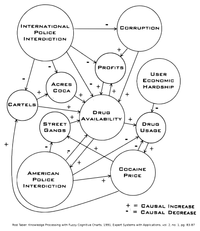
Photo from wikipedia
A fuzzy cognitive map (FCM) is a graph-based knowledge representation model wherein the connections of the nodes (edges) represent casual relationships between the knowledge items associated with the nodes. This… Click to show full abstract
A fuzzy cognitive map (FCM) is a graph-based knowledge representation model wherein the connections of the nodes (edges) represent casual relationships between the knowledge items associated with the nodes. This model has been applied to solve various modeling tasks including forecasting time series. In the original FCM-based forecasting model, causal relationships among concepts of the FCM remain unchanged. However, causal relationships may change in time. Therefore, we propose a new learning method for training an FCM resulting in an adaptive FCM which consists of several sub-FCMs. It can select different sub-FCMs at different moments. In an active processing scenario, in which we deal with a large-scale time series with new data being continuously generated, a forecasting model built on the old data should be updated when the new data arrive. Furthermore, retraining an FCM from scratch entails increasing computing overhead that will become a serious obstacle in many practical scenarios. To overcome the above-mentioned shortcomings, this study offers an original design setting in which the FCM is updated by knowledge-guidance learning mechanism for the first time. Compared with the existing classical forecasting models, the proposed model shows higher accuracy and efficiency. Its increased performance is demonstrated through a series of reported experimental studies.
Journal Title: IEEE transactions on cybernetics
Year Published: 2021
Link to full text (if available)
Share on Social Media: Sign Up to like & get
recommendations!